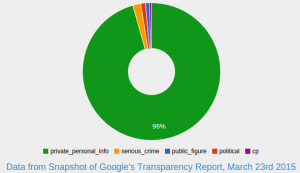Google ordered to remove links to ‘right to be forgotten’ removal stories by Samuel Gibbs.
From the post:
Google has been ordered by the Information Commissioner’s office to remove nine links to current news stories about older reports which themselves were removed from search results under the ‘right to be forgotten’ ruling.
The search engine had previously removed links relating to a 10 year-old criminal offence by an individual after requests made under the right to be forgotten ruling. Removal of those links from Google’s search results for the claimant’s name spurred new news posts detailing the removals, which were then indexed by Google’s search engine.
Google refused to remove links to these later news posts, which included details of the original criminal offence, despite them forming part of search results for the claimant’s name, arguing that they are an essential part of a recent news story and in the public interest.
Google now has 35 days from the 18 August to remove the links from its search results for the claimant’s name. Google has the right to appeal to the General Regulatory Chamber against the notice.
…
It is spectacularly sad that this wasn’t the gnomes that run the EU bureaucracy, looking for something pointless to occupy their time and the time of others.
No, this was the Information Commissioner’s Office:
The UK’s independent authority set up to uphold information rights in the public interest, promoting openness by public bodies and data privacy for individuals.
Despite this being story of public interest and conceding that the public has an interest in finding stories about delisted searches:
27. Journalistic context — The Commissioner accepts that the search results in this case relate to journalistic content. Further, the Commissioner does not dispute that journalistic content relating to decisions to delist search results may be newsworthy and in the public interest. However, that interest can be adequately and properly met without a search made on the basis of the complaint’s name providing links to articles which reveal information about the complainant’s spent conviction.
The decision goes on to give Google 35 days from the 18th of August to delist websites which appear in search results on the basis of a censored name. And of course, the links are censored as well.
Despite having failed to fix the StageFright vulnerability which impacts 950 million Android users, the Information Commissioner’s Office wants to fine-tune the search results for a given name to exclude particular websites.
In the not too distant future, the search results displayed in Google will represent a vetting by the most oppressive regimes in the world to the silliest.
Google should not appeal this decision but simply ignore it.
It is an illegal and illegitimate intrusion both on the public’s right to search by any means or manner it chooses and Google’s right to truthfully report the results of searches.
